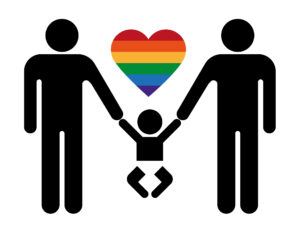The Children of Gay Couples Keep Being Discriminated By Their Government

(Image via Getty)
Last week, a Ninth Circuit Court of Appeals panel issued a very short opinion in favor of the Dvash-Banks family. That’s great news! For now. The poor family has been put through the ringer by the government after a customs officer informed the new parents that only one of their infant twin boys would be recognized as a United States citizen. Since that time, the parents — along with the nonprofit firm Immigration Equality, and the very profitable firm Sullivan & Cromwell, as pro bono counsel — have been fighting for their other twin son to also be recognized as a U.S. citizen.
You may recall this case and similar ones like it. (Here is a podcast interview with the Mize-Gregg family — a married couple, both U.S. citizens, whose daughter was similarly denied citizenship.) The U.S. government has been insisting that children born of married U.S. citizens must also be biologically related to *both* parents, or else the children fall within the “unwed” parents section of the immigration code. That is, even if the parents are actually, you know, wed. Of course, asking parents who are applying for citizenship for their children whether both parents are genetically related to the child is discretionary, and the question tends to be asked of same-sex couples by default, and much less often or never, of heterosexual couples who may have conceived with the help of egg, sperm, or embryo donation.
The government has argued that inherent in the language “born of … parents” found in the immigration code is an implication that the child is biologically related to both parents. Since the technology is not there (yet!) for two men to both be genetically related to the same child, a married same-sex male couple could never satisfy the government’s overly restrictive interpretation. Luckily for these families, the government has been losing this argument over and over again. And over again. First, in the lower court with Dvash-Banks, then a federal court in Maryland with the Kiviti family, and again less than two months ago in federal court in Georgia in the Mize-Gregg case. While the government has not filed an appeal in the Mize-Gregg case, it is still within the 60-day window where the government may file an appeal, and based on Dvash-Banks and Kiviti, that appeal is coming.
It’s A Win, But It’s Not Over
In the Ninth Circuit decision last week, the court took all of one page — well, technically three pages with the case caption and judges’ signatures — the court noted it had no choice but to follow binding precedent. Two cases — called Scalesand Solis-Espinoza — are directly on point and controlling. So the opinion, which included an appointee of President George W. Bush and an appointee of President Donald Trump, noted matter-of-factly that the government “concedes that Scales and Solis-Espinoza control this case and has appealed to preserve the argument that those cases were incorrectly decided. “As a three-judge panel, we are bound by Scales and Solis-Espinoza.”
So what’s next? While most of us would like to think the government would shake hands, say “good game,” admit defeat, and change its constitutionally questionable policy, that is probably not its next move. The government has two choices. First, it can request what’s called an en banc hearing by a larger panel of the Ninth Circuit. Instead of a three-judge panel, the case would be randomly assigned 10 judges from the Ninth Circuit’s roster of appellate judges. An en banc panel, unlike the three-judge panel, would not be required to follow the earlier panel precedents.
The other alternative is to request to go straight to the Supreme Court. The government can also pursue this option and request to be heard by the Supreme Court even if it seeks but loses an en banc appeal, if it went that route first.
While Amy Coney Barrett’s outlook on embryos and IVF may be grim, it is unclear how she — if confirmed as a Supreme Court Justice — would interpret the immigration code. In any event, I wouldn’t get my hopes up that she is a champion of same-sex parents under the Constitution. So while the latest decision should be an opportunity for the Dvash-Banks family to rejoice, they, and all similar situated families, are not out of the woods yet.

Comments